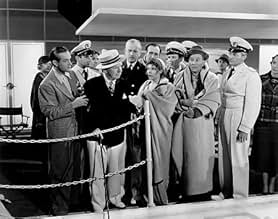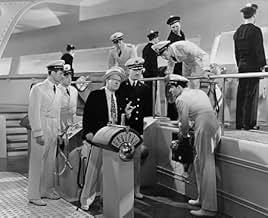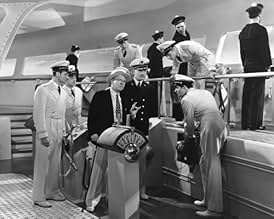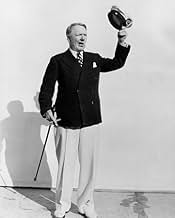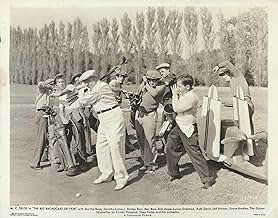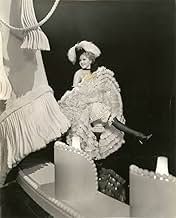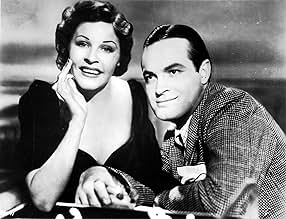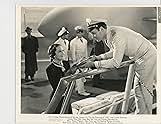CALIFICACIÓN DE IMDb
6.1/10
1.1 k
TU CALIFICACIÓN
Mr. Bellows causa confusión cómica en una competencia entre transatlánticos, en medio de romances y actos musicales.Mr. Bellows causa confusión cómica en una competencia entre transatlánticos, en medio de romances y actos musicales.Mr. Bellows causa confusión cómica en una competencia entre transatlánticos, en medio de romances y actos musicales.
- Dirección
- Guionistas
- Elenco
- Ganó 1 premio Óscar
- 5 premios ganados en total
Leif Erickson
- Bob Hayes
- (as Leif Erikson)
Virginia Vale
- Joan Fielding
- (as Dorothy Howe)
Opiniones destacadas
There are momentary gems in this movie, and I recently bought the DVD because I fondly remembered it from its television broadcasts during my childhood. Hope and Ross's "Thanks for the Memory" (that's the actual spelling; it isn't plural) is so well portrayed that it seems they are recalling actual moments from their lives. This is almost the only moment of sincerity in this otherwise farcical fluff-piece. Martha Raye's "Oh, Mama!" is eye-popping primarily because I believe she did her own stunts in it, and she is bandied about like an unlucky mouse caught by a gruesomely playful puss. WC Fields sparks frequent smirks with his ostentatious manner combined with total buffoonery. Dorothy Lamour is only pleasant; I don't believe she had yet found her spark for comedy that was later displayed in the Hope & Crosby Road Movies. Her song (she only gets one but sings it ad infinitum to Leif Erickson), along with the remainder of the musical score, is surprisingly engaging. All in all an enjoyable musical comedy review, designed so audiences could finally see the faces of the performers they invited into their living rooms through the radio.
7tavm
W.C. Fields and Bob Hope are probably the reasons anyone would still watch The Big Broadcast of 1938
This was my third time in watching this movie when I popped the DVD in just now. It's notable as W.C. Fields' last for Paramount, and Bob Hope's first feature after years of doing shorts. It also marked the first time Hope performed what became his theme song-"Thanks for the Memory"-which, as performed here, was originally a bittersweet ditty of a love that had its ups and downs with Shirley Ross providing a nice share of wit in duetting with Hope in singing it. Fields is funny whether playing golf, pool, or trying to run the ship though I admit I rewinded some of his scenes to try to understand what he's saying! Two future Hope co-stars, Dorothy Lamour and Martha Raye, provide some charms along the way with Ms. Lamour singing a nice romantic ballad and Ms. Raye doing some great comic banter and slapstick. There's also some amusements from Ben Blue and a forgotten lady named Patricia Wilder as a Southern belle doing deadpan shtick. Oh, and an animated sequence produced by Leon Schlesinger though since he was just a money man, it could possibly have been helmed by whoever was the "supervisor" under him at the time like Fred "Tex" Avery, Robert Clampett, or Frank Tashlin. No great shakes but The Big Broadcast of 1938 is worth a look for historical reasons and if you find the people I mentioned entertaining.
The trans-Atlantic race is on between the two great ocean liners, the Colossal and the Gigantic. On board the Gigantic (or is it the Colossal? Not even all of the passengers are sure) is an assortment of characters who present us with a sort of variety show over the course of the voyage:
The plot is an uneven mishmash, but some good songs stand out. Lamour sings "You Took the Words Right Out of My Heart," a lovely ballad. Raye does one called, "Mama, That Moon Is Here Again," which builds into a wild acrobatic dance in which sailors toss Martha all around the deck. The performance by Hope and Ross of "Thanks for the Memory" is truly excellent—it's a bittersweet song that we all know and yet it actually means something in its context of two old lovers hashing over regrets and falling back in love. It's a wonderfully touching and low key performance.
In between these highlights is a lot of nonsense, some of it amusing. The plot doesn't exactly buzz along—it stops and starts too much before ultimately drawing to a rather hasty resolution at the end of the voyage. It is kind of like of a big broadcast, a radio all star variety program, I suppose. Taken as a whole, it's really not that great a picture—but it's certainly worth seeing for the sake of its numerous highlights.
- W.C. Fields, ship's owner. He stops on the way to the pier for a game of golf ("Stand clear, keep your eye on the ball," he tells his large team of caddies) and so has to catch up with the ship by flying in on his mini-helicopter. He's nuts. He has a daughter...
- Martha Raye: According to pop Fields, "She's an unfortunate girl .Seven years ago, she crashed an aeroplane in a mirror factory. Broke 9,831 mirrors."
- Bob Hope: A radio announcer broadcasting updates on the race, he is accompanied on the journey by his three ex-wives, who intend to prevent prospective wife number four from cutting into their alimony checks ("She can't chisel me down to any 25%....").
- Dorothy Lamour, who has second thoughts about becoming that fourth wife when she meets
- Leif Erickson, handsome and brilliant young engineer who has designed the special propulsion system for the ship.
- Shirley Ross, one of the ex-wives. She and Hope get to chatting and can't quite remember why they ever divorced in the first place.
The plot is an uneven mishmash, but some good songs stand out. Lamour sings "You Took the Words Right Out of My Heart," a lovely ballad. Raye does one called, "Mama, That Moon Is Here Again," which builds into a wild acrobatic dance in which sailors toss Martha all around the deck. The performance by Hope and Ross of "Thanks for the Memory" is truly excellent—it's a bittersweet song that we all know and yet it actually means something in its context of two old lovers hashing over regrets and falling back in love. It's a wonderfully touching and low key performance.
In between these highlights is a lot of nonsense, some of it amusing. The plot doesn't exactly buzz along—it stops and starts too much before ultimately drawing to a rather hasty resolution at the end of the voyage. It is kind of like of a big broadcast, a radio all star variety program, I suppose. Taken as a whole, it's really not that great a picture—but it's certainly worth seeing for the sake of its numerous highlights.
I really don't understand what some people expect when they watch an old movie like this. This one in my estimation, is light hearted and entertaining. It is a showcase for some of our greatest stars as they were just starting out. Is it their best effort? Probably not. But it is fun to watch if you don't take it too seriously. I'm awfully glad we have it around to watch. Being a fan of almost every star in it, I consider it a treasure chest of many favorites talent. W.C. Fields is wonderful through out the film. Some of his skits are hilarious! Bob Hope is so good in his role that you have to really feel sorry for his character. Of course the song "Thanks For The Memories" is forever linked to him with this film. Martha Ray is hilarious in another one of her zany roles. All in all, a very good and entertaining film to be watched over and over. A real, or reel part of history.
This movie is very dear to me. I saw it on late-night TV when I was about 12 years old, tape-recorded the sound track and listened to it over and over again. This is a movie that has everything: wacky W. C. Fields bits like his golf and pool routines, Bob Hope bombing out with the crowd on the ship (imagine, in his first movie role he can't even raise a laugh!), bizarre but charming performers like Shep Fields with his Rippling Rhythm orchestra (whom Lawrence Welk obviously ripped off), accompanied by an even more bizarre animated segment.
It's almost like watching a '30s stage revue of really gifted and varied performers, including a Mexican singer so beautiful he must be gay, and Martha Raye doing her foghorn bit. But the crowning glory of this film is the funny and poignant duet, Thanks for the Memory, with Bob Hope and Shirley Ross.
Most people know the tune as Bob's theme song, but few know the clever, tender, almost Dorothy Parker-like lyrics. This is the story of a sophisticated but madcap couple, not unlike Nick and Nora Charles, running through money like water, traveling the world, and finding bliss in bed. Each verse tells a little bit more of their story in an arch, clever way that is never too trite because of Shirley Ross's marvelous acting. Her facial expressions reveal the deeper story underneath the actual events, a couple who were madly in love but stormy and tempestuous, with fights that may have included screaming and hair-pulling.
Shirley makes reference to "the night you came home with lipstick on your tie", making it sound like an uproarious joke, while Bob rolls his eyes in discomfort. He sings of "that weekend in Niagara when we hardly saw the falls," and Ross murmurs, "How lovely that was." "Thank you," Bob replies.
This is a fresh and sensitive take on what could be a very sentimental song, and I can never see it without tearing up at the end. This movie is worth renting or buying, if you can find it, as a great example of '30s entertainment with the bonus of a truly great "love-lost" song.
It's almost like watching a '30s stage revue of really gifted and varied performers, including a Mexican singer so beautiful he must be gay, and Martha Raye doing her foghorn bit. But the crowning glory of this film is the funny and poignant duet, Thanks for the Memory, with Bob Hope and Shirley Ross.
Most people know the tune as Bob's theme song, but few know the clever, tender, almost Dorothy Parker-like lyrics. This is the story of a sophisticated but madcap couple, not unlike Nick and Nora Charles, running through money like water, traveling the world, and finding bliss in bed. Each verse tells a little bit more of their story in an arch, clever way that is never too trite because of Shirley Ross's marvelous acting. Her facial expressions reveal the deeper story underneath the actual events, a couple who were madly in love but stormy and tempestuous, with fights that may have included screaming and hair-pulling.
Shirley makes reference to "the night you came home with lipstick on your tie", making it sound like an uproarious joke, while Bob rolls his eyes in discomfort. He sings of "that weekend in Niagara when we hardly saw the falls," and Ross murmurs, "How lovely that was." "Thank you," Bob replies.
This is a fresh and sensitive take on what could be a very sentimental song, and I can never see it without tearing up at the end. This movie is worth renting or buying, if you can find it, as a great example of '30s entertainment with the bonus of a truly great "love-lost" song.
¿Sabías que…?
- ErroresNear the end of the movie the helmsman said that the S.S. Gigantic was diesel powered. That would mean that the liner's proper name would be MV (Motor Vessel) Gigantic as opposed to SS (Stream Ship) Gigantic.
- Citas
First reporter: Say, do you know anything about electricity?
S.B. Bellows: My father occupied the chair of applied electricity at State Prison.
- ConexionesFeatured in Hollywood and the Stars: The Fabulous Musicals (1963)
- Bandas sonorasThis Little Ripple Had Rhythm
(uncredited)
Music by Ralph Rainger
Performed by Shep Fields and His Rippling Rhythm Orchestra
Selecciones populares
Inicia sesión para calificar y agrega a la lista de videos para obtener recomendaciones personalizadas
- How long is The Big Broadcast of 1938?Con tecnología de Alexa
Detalles
- Fecha de lanzamiento
- País de origen
- Idioma
- También se conoce como
- Radioparaden 1938
- Locaciones de filmación
- Eastern Service Studios, Astoria, Queens, Nueva York, Nueva York, Estados Unidos(sequence: Kirsten Flagstad aria)
- Productora
- Ver más créditos de la compañía en IMDbPro
- Tiempo de ejecución1 hora 31 minutos
- Color
- Relación de aspecto
- 1.37 : 1
Contribuir a esta página
Sugiere una edición o agrega el contenido que falta

Principales brechas de datos
By what name was The Big Broadcast of 1938 (1938) officially released in India in English?
Responda
